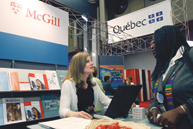Welcoming the globetrotting student
Welcoming the globetrotting student McGill University
User Tools (skip):
Welcoming the globetrotting student
International educators converge on Montreal

Ginette Sansfaçon, recruitment officer for McGill's Admissions, Recruitment and Registrar, chats with Diane Davies from the University of Adelaide, South Australia, at McGill's booth at the NAFSA Conference.
Owen Egan
This year's meeting of NAFSA: Association of International Educators, brought more than 6,500 delegates to Montreal and, despite a decline in the numbers of foreign students attending university in the United States, overall international movement has increased. That made for lots of domestic movement at the Palais des Congrès, from Scotland pushing a program that allows foreigners to stay in the country up to two years after graduation, to a session on the challenges facing transgendered students who have the desire to study abroad.
McGill Director of Admissions Kim Bartlett was happy to have the southern exposure the university gets from NAFSA, the majority of whose members hail from the U.S.
"McGill has the largest representation of U.S. students. Our initial links were with the Ivy League schools. We used to play hockey with them. It's a good fit to have the U.S. here," she said, after taking part in a session called "Maple Fudge, Poutine and Hockeysticks: A User's Guide to Canadian Education," at which she helped explain the Quebec CEGEP and university systems. Her session was well attended despite competing against an address given by Iranian Nobel Peace Prize winner Shirin Abadi.
On the international scene, McGill's numbers have been impressive. It attracts students from over 150 countries who make up approximately 20 percent of the full-time enrolment. According to McGill's Office of International Research (OIR), faculty members are involved in over 80 active projects that the OIR is sponsoring, worth approximately $70 million, with another 70 initiatives under development.
According to the Association of Universities and Colleges of Canada (AUCC), the country's universities currently have over 3,500 active institutional agreements with partners around the world, have trained over 260,000 people in the developing world and enroll more than 70,000 international students at undergraduate and graduate levels. The AUCC recently called for a tripling of the present number to 18,000 students annually by 2010 and wants a scholarship program "to attract this particular group of highly qualified students."
Earlier this spring the government of Canada announced that foreign students will now have better access to Canada's job market. The rule that restricted international students to jobs on campus has been replaced by one that will allow for up to 20 hours of off-campus work during the school year and full-time otherwise. The change will benefit 100,000 students. McGill's Manager of International Student Services, Pauline L'Ecuyer, presenting at a session called "Entry to Canada: The Full Mountie," was happy not only to have this long-awaited news for her students but also to hear that the government has been able to quickly process the work visas for the program.

